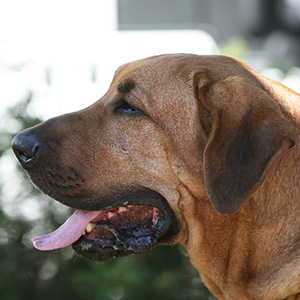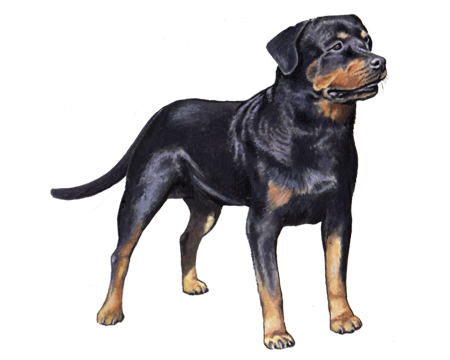
Broholmer
The Broholmer is a large dog with a resounding bark and confident walk. Intelligent, alert, and loyal, Broholmers love cuddling with their people. These mighty pups tend to be good with children and other dogs, making them great family companions.
Interested in discovering if your dog is a Broholmer?
Check out Wisdom Panel's DNA tests.

Broholmer Traits
General Appearance
Broholmers have solidly built, rectangular bodies that move in a composed yet powerful way.
Coat and Colouring
The Broholmer's short, dense coat is generally light-yellow, brownish-yellow, or black.
Distinctive Physical Traits
A big, broad head and short drop ears are stand-out features of the Broholmer.
Broholmer Temperament
Broholmers are calm, docile, and even-tempered. They may be wary of strangers, but they're loyal and affectionate to their family. Keep in mind, however, that Broholmers are best for families with older children who know how to approach and play with large dogs.
Despite their large size, Broholmers often act as though they think they are lap dogs. They love to be around—or even on—members of their human pack.
As a big breed, the Broholmer requires a large home with a yard. And because Broholmers can also be stubborn or willful, training is a must.


Broholmer History
A large Molosser breed from Denmark, the Broholmer was the result of crossbreeding English Mastiffs with local German dogs. The breed's numbers fell sharply during World War II. But since the 1970s, Broholmer populations have been steadily rising.
As with many of the Molosser breeds, the Broholmer's intended job was to guard homes of the wealthy. In present-day, however, these big pups more often serve as gentle companion dogs. That said, Broholmers still possess protective tendencies.
Broholmer Care
Nutrition
Broholmers need a high-quality diet that is age-appropriate. And because the breed is prone to weight gain, you should carefully monitor your Broholmer's food intake. Also, remember that giving too many treats can contribute to obesity.
Grooming
Regular weekly grooming and the occasional bath will ensure your Broholmer stays neat and tidy. Trim their fast-growing nails regularly to keep them from growing too long, as this can create problems with walking.
Broholmers also benefit from a consistent dental care routine. Ans their ears should be checked frequently to avoid wax buildup and debris.
Exercise
Given its size, the Broholmer is surprisingly agile. Though not particularly high-spirited, Broholmers do love being outdoors where they can play. And if Broholmers don't get daily exercise, they sometimes develop behavioral problems.
Most Broholmers enjoy playing hide-and-seek, retrieving balls, and catching frisbees. These activities both exercise and entertain your Broholmer's body and mind. Like camping, hiking, frolicking in the park, or strolling around the neighborhood? Your Broholmer will be an eager tagalong. If you limit outdoor activity to your yard, make sure the area is fenced and secure.
Training
Training Broholmers is relatively easy, as they are intelligent and eager to please. But since they can also be stubborn, you must take charge as the dominant pack leader. And you should continue training throughout your dog's life to prevent future disobedience.
The Broholmer is generally not aggressive toward people or other dogs. But early socialization is always a good idea to ensure your pup grows up to be a well-adjusted dog.
Breed Group
Guard
Dogs of the Guard Group were bred to guard people and property. They are often quick to learn and these intelligent, capable animals make solid companions.























